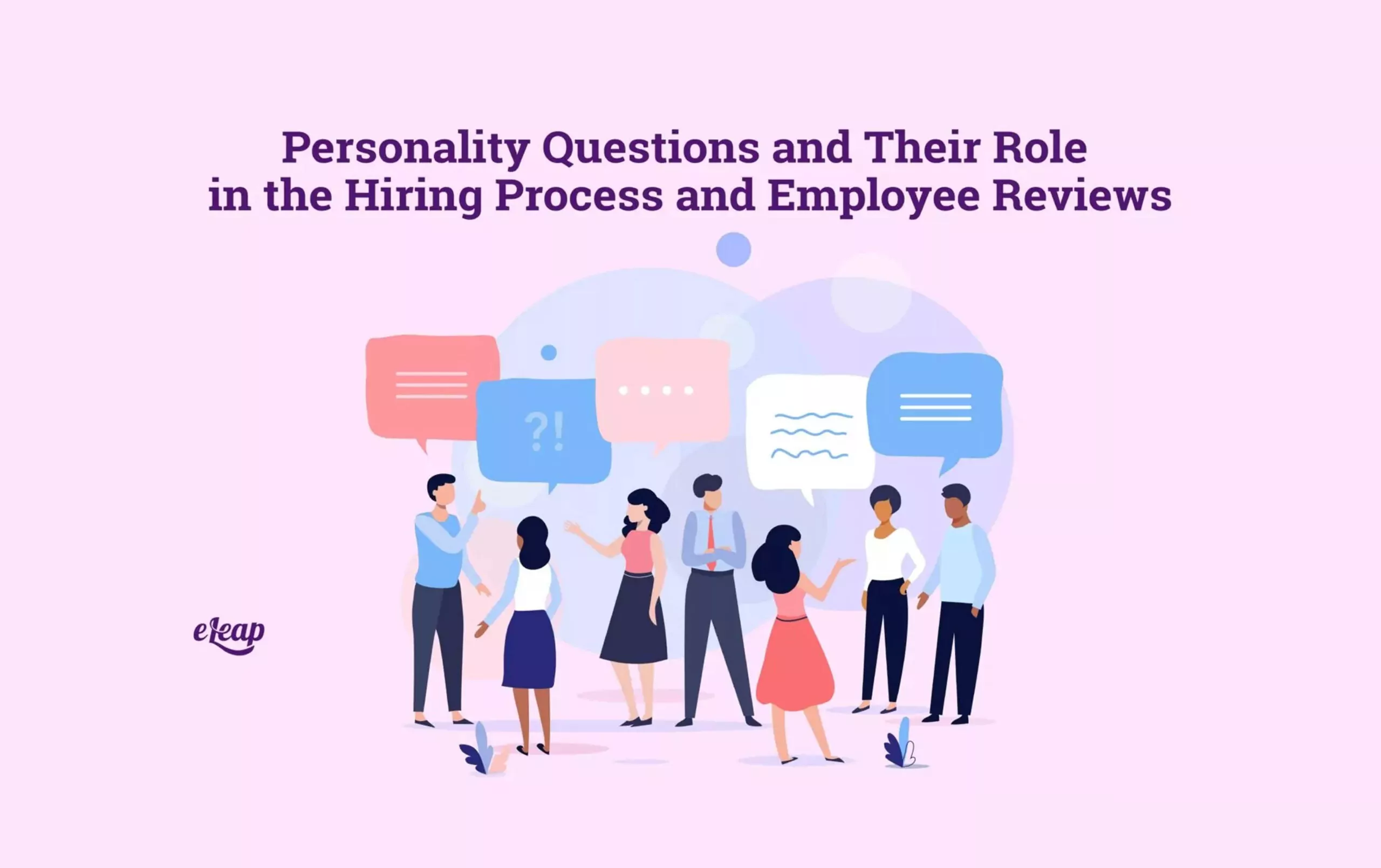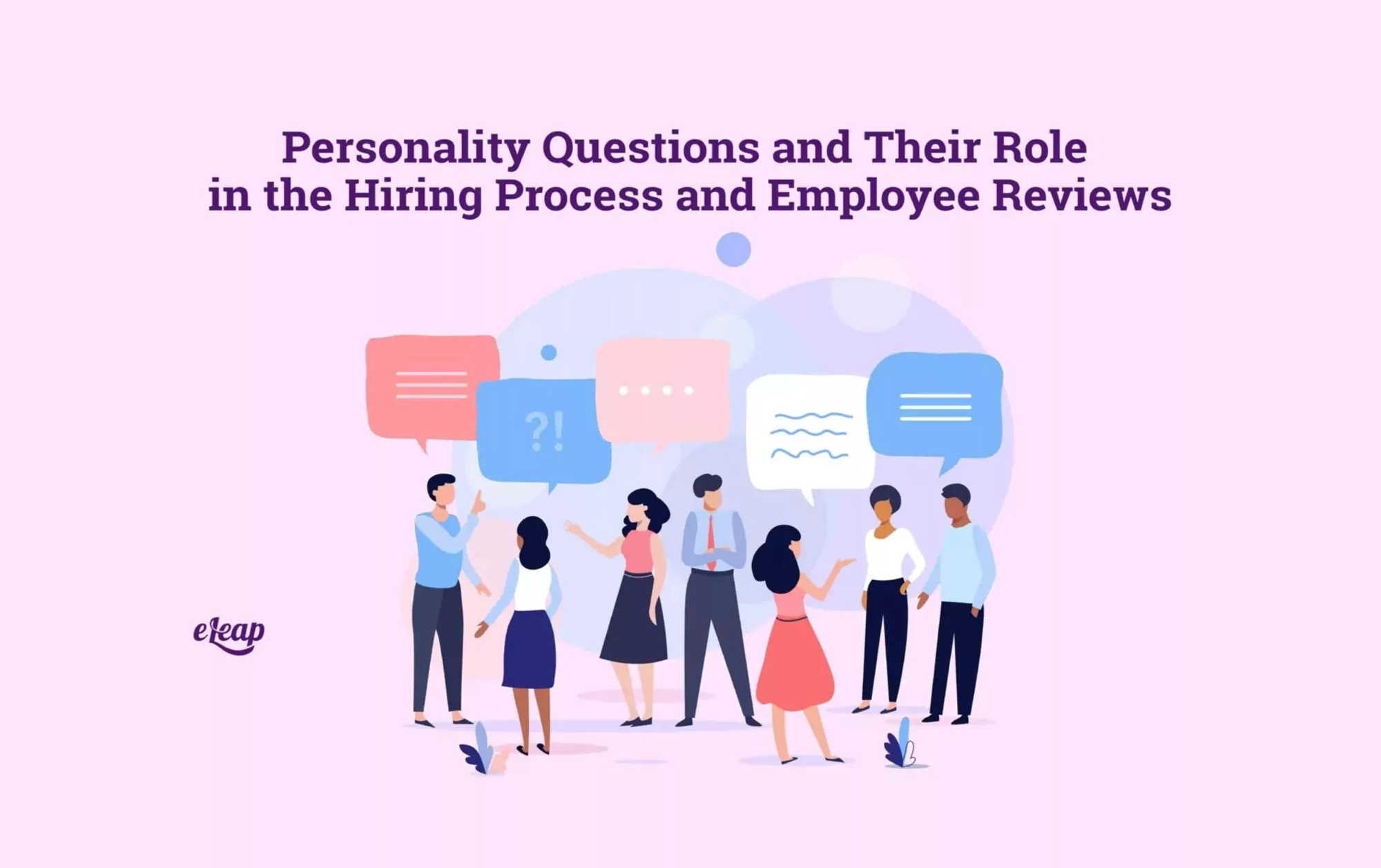Personality Questions and Their Role in the Hiring Process and Employee Reviews

Personality questions can help managers and leadership teams better understand their prospective or current employees. Quantifying educational background, certifications, and specific skills on a person’s resume is easy, but personality characteristics are not as easily measured. Therefore, personality questions posed in interviews and performance reviews can provide pivotal insight into an employee’s personality tendencies and assist managers in deciding whether or not a person is a good fit for their current team and if their personality traits could be better used in other areas of the company.
What Are Personality Interviews?
A personality interview is an assessment aimed at illuminating an individual’s personal characteristics and behavioral tendencies and how those characteristics can be useful in the workplace. Managers can use the information gathered, typically in the hiring process, to help them learn how a person’s unique personality could either add to or detract from an existing team or job role. Personality questions are designed to draw out character traits that cannot be seen or assessed through other means.
Drawbacks of Personality Interviews
These types of evaluations are not without flaws. While they do an excellent job of gathering information through specific personality questions, these questions can sometimes only focus on specific or isolated characteristics instead of someone’s entire personality. In other words, the traits that come through in the answer might not accurately represent the person. Many personality questions don’t account for the fact that the prospective employee may respond differently to the same situation in different environments, such as being at work versus being in a social situation with friends. Many different types of people may be well-suited to a given job, but some deal-breaking negative personality traits could be missed by personality questions geared toward fishing out only the desirable characteristics.
How to Effectively Utilize Personality Interviews
When used correctly, personality interviews can be practical tools for management teams to learn the personality traits their potential or current employees bring. The following are a few tips on how to maximize the benefits of personality interviews:
Asking the Right Personality Questions
The key to making them successful is to, first and foremost, ask suitable types of questions. The best personality questions can determine a person’s affinity for working as part of a team, their interest in personal or professional development, whether they are competitive, their organizational skills, and much more. Interviewers can even use icebreaker questions sprinkled in between resume-related questions to help the candidate open up and feel more comfortable in the interview so that they are more likely to answer other questions genuinely. Asking simple questions like “What does a day off with your family look like?” can be a great precursor to asking a question about their long-term goals, given that you’ve probably just planted their biggest motivator at the front of their minds with the previous question.

Some other examples of personality questions include:
- Tell us about yourself.
- What draws you to this position?
- Why do you think this company is a good fit for you?
- What is causing you to leave your current company? – or – Why are you currently unemployed?
- How would you describe yourself?
- What does success mean to you?
- What pace do you prefer to work at?
- If you thought your boss was wrong about something, how would you bring it up?
- What would you do differently about your life in the last five years?
- What motivates you to succeed?
- Talk about a time you took on extra responsibility in the workplace.
Personality questions about the person’s hobbies and passions can help shed light on what they enjoy doing in their spare time, which can help managers make connections with activities similar to the job role. For instance, if they say they enjoy knitting, it could be a sign that they find repetitive and detailed tasks relaxing, and they may be highly efficient with tasks such as data entry. If a candidate says they enjoy free hiking and wilderness navigation, it could indicate an affinity for challenges and problem-solving situations with attention to detail and mindfulness about safety.
Be Mindful of a Candidate’s Potential
While it may be easy to take the candidate’s answers at face value because that’s what human nature tells us to do, it’s still important to think critically about the potential that presents with certain personality traits. For instance, I could ask them how they might solve a specific problem that frequently arises in their interviewing position and then hear them work through how they would solve it. Their response can give insight into how they would utilize their specific skills on the job, their enthusiasm for meeting challenges head-on, and how they think through issues.
Don’t Be Afraid to Press for Honesty and Elaboration
If a candidate claims they have specific desirable attributes that make them suitable for the job, ask them for specific examples. It’s easy for a candidate to tell a hiring manager what they think they want to hear, but try to coax them to dig deeper into their supposed personality traits, which cannot be measured by a test or certification. If they state that they are driven and hardworking, ask them for examples from previous employment and life experiences that support that claim.
Pay Attention to How a Candidate Responds to Pressure
While an interview scenario is often far removed from the literal conditions of the job, it can still be an intimidating part of the hiring process for candidates. While some nerves are normal, note how the candidate handles the interview. Can you tell if they are nervous? Do they stutter over their responses to your questions? On the other hand, do they seem relaxed and at ease? While showing signs of being comfortable in an interview is good, seeming too comfortable or bored is probably not a good sign and might allude to a lack of enthusiasm for the company or the position.
Know What Traits Are Most Important
Interviewing managers should already know what personality traits are most important for a candidate to possess (or not possess) to be a good fit for the position. In addition to personality questions written to find such traits, you could create a rating system for each attribute to rate each candidate for each desired or undesired quality. This creates a common standard for more personalized questions that could yield a wide range of responses so managers can look back and compare candidates based on the same rating scale.
Other Ways to Analyze a Candidate’s Personality
In addition to personality questions during the interview process, there are other ways hiring managers can get to know a candidate’s personality. For example, checking their social media profiles and reviewing how they present themselves online can provide some additional information about their personality and even core values. A person’s behavior on social media is usually a good indicator of their overall personality.
In addition to checking their social media profiles. Hiring managers should put adequate effort into thoroughly vetting candidates in all capacities. If their resume indicates they started furthering their education, check in on how that’s going. Make a note of volunteer involvement and other extracurricular activities. Thoroughly investigating them is part of your due diligence as a team leader or hiring manager.
Also, make sure the candidate has ample opportunity to ask questions. The questions they have could tell you what’s important to them about the job. If they ask about salary right away, it could indicate they’re only looking for financial benefit from getting the job and aren’t interested in becoming an asset to the company.
In Conclusion
Finding employees who perform well and easily integrate into an existing team can be challenging. However, personality questions can assist hiring managers in identifying the personal qualities a candidate could bring to an organization. These types of questions can also be integral in performance reviews in the future to revisit reasons an employee might’ve been hired in the first place and relate them to their current performance.
Overall, there is more to a person than the skills and accolades listed on their resume in articulate font. The key to finding the right fit for an organization is for hiring managers to get to know the candidates’ personalities. They must discern whether they will work well with the current team and align with the organization’s values. Personality questions can be pivotal in narrowing down the right person for the job.